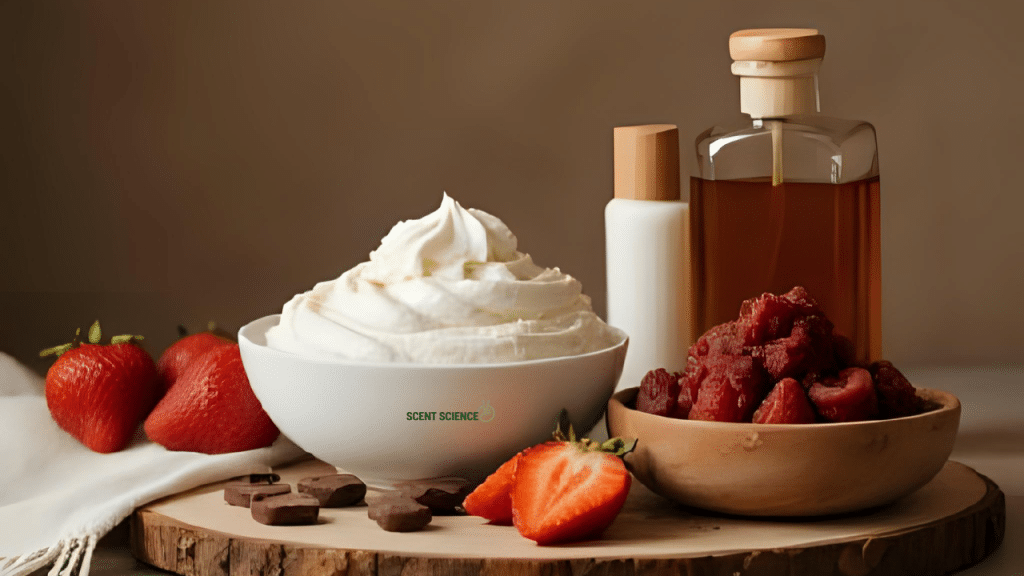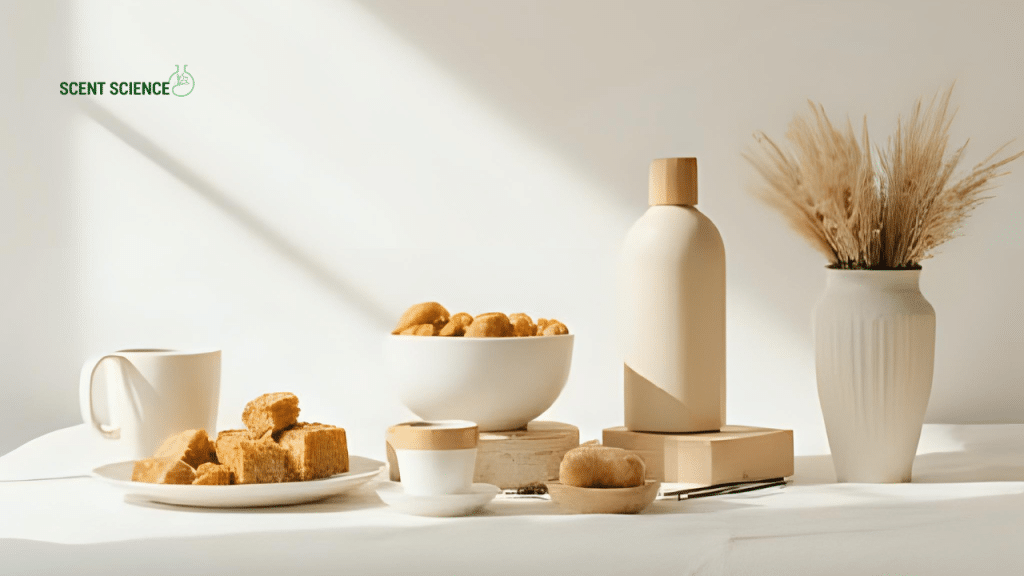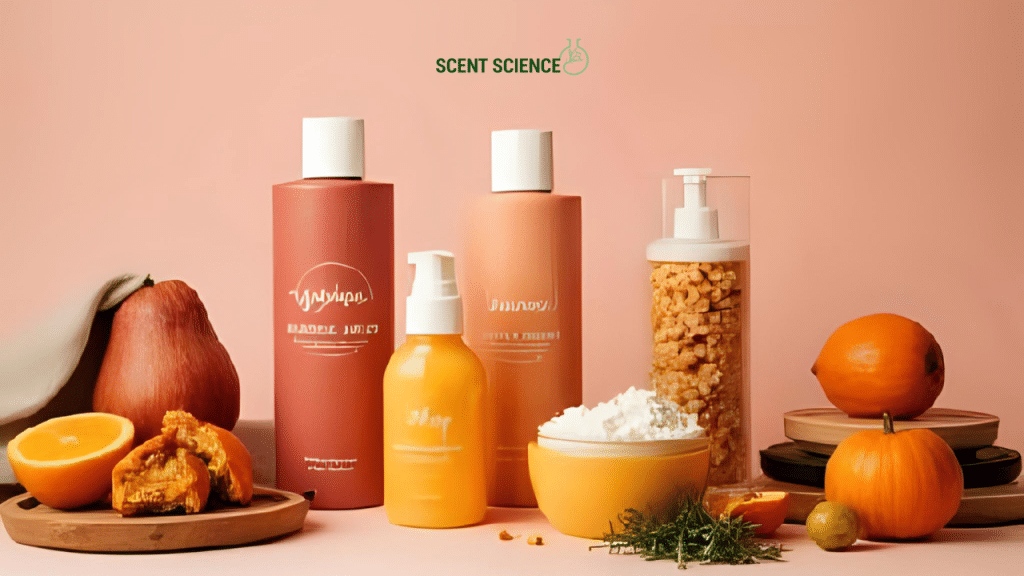Ever catch yourself sniffing a body lotion that smells like vanilla cake or a lip balm that’s pure chocolate fudge—and loving it? You’re not alone. Food-scented beauty products have taken over the beauty world in 2025, and science says it’s more than just nostalgia.
These sweet, edible-inspired scents are doing more than just smelling delicious—they’re tapping into the deepest parts of our brains. From dopamine hits to emotional triggers, there’s real neuroscience behind why we’re obsessed.
In this article, you’ll learn:
- The psychology behind our love of food-scented beauty products
- How scent and memory shape our emotional responses
- What brain science says about edible aromas in skincare
- The top trending food-inspired beauty scents for 2025
Let’s dig into why you crave cupcakes in your cosmetics—and what your brain has to do with it.
Table of Contents
ToggleThe Psychology of Scent and Appetite
Why Food-Scented Beauty Products Are Irresistible
Humans are biologically hardwired to respond to food aromas. When you smell something sweet or savory, your brain’s reward centers light up.
According to studies in sensory psychology, scents like vanilla, caramel, cinnamon, and chocolate:
- Trigger the release of dopamine, the feel-good hormone
- Evoke comfort and safety, linked to childhood or cultural memories
- Activate cravings, even without the need to eat
Food-scented beauty products capitalize on this connection. When your lotion smells like a warm cookie, your brain reacts just like it would if you were actually baking.
Key takeaway: Our brains treat food scents in skincare the same way they treat real food—with pleasure and reward.
Scent and Memory: The Power of Nostalgia
Why That Birthday Cake Body Spray Feels Like Home
The olfactory system (our sense of smell) is closely tied to the limbic system—the part of the brain that manages emotions and memories. This is why:
- A whiff of pumpkin spice can take you back to autumn evenings
- The smell of chocolate fudge reminds you of family holidays
- A coconut body mist transports you to your last vacation
Food-scented beauty products aren’t just trend-driven—they’re emotional tools. They evoke powerful memories that make you feel relaxed, joyful, or safe.
In 2025, brands are leveraging this science to develop scents that don’t just smell good—they feel personal.
The Neuroscience of Food Scents in Skincare
How Your Brain Reacts to Edible Aromas in Beauty
Here’s what happens in your brain when you use a food-scented beauty product:
- Olfactory signals are transmitted directly to the limbic system (unlike other senses, which go through the thalamus)
- The brain processes these signals as both emotional and rewarding
- The smell can cause physiological responses—such as calming heart rate or boosting mood
Research from neuroscience journals confirms that food-related scents:
- Increase levels of serotonin and oxytocin, promoting feelings of happiness and comfort
- Reduce stress and anxiety, especially scents like vanilla or cinnamon
- Improve sleep quality, especially when used in nighttime skincare routines
So, it’s not just marketing hype—your brain really does crave that vanilla-bean moisturizer.
2025’s Top Trending Food-Scented Beauty Products

Sweet, Savory, and Sensory-Driven Favorites
This year’s top beauty launches prove just how strong the trend has become. The most popular food-scented beauty products include:
- Frosted Donut Body Butter: Rich in shea butter and infused with warm vanilla icing scent
- Salted Caramel Lip Oil: A glossy balm with hydrating oils and a buttery toffee aroma
- Matcha Latte Face Mist: Packed with antioxidants and a fresh green-tea scent
- Pineapple-Coconut Hair Mask: Tropical escape with nourishing ingredients
- Espresso-Infused Eye Cream: Combines caffeine with real espresso aroma for an energizing wake-up
Consumers say these products offer more than just skincare—they’re a multi-sensory treat.
Pro tip: Look for products that combine real skin benefits with authentic food-grade scents, rather than artificial fragrance-only formulas.
The Rise of Gourmand Fragrance Families
From Perfume to Skincare: The Evolution of Sweet Scents
In fragrance, the term “gourmand” refers to scents that mimic edible notes like caramel, coffee, vanilla, and chocolate. Originally popularized in perfumes like Thierry Mugler’s Angel, gourmand has now infiltrated:
- Body lotions
- Hair mists
- Lip care
- Face masks
2025 marks a shift from traditional florals or citrus notes to richer, indulgent scent profiles that make beauty feel edible.
Why the shift?
- Post-pandemic self-care culture: Comfort-driven beauty
- TikTok trends: Gen Z loves “smelling like dessert”
- Emotional escapism: Food scents provide emotional grounding
Conclusion: Gourmand = indulgence + emotional connection + sensory luxury
Clean Beauty Meets Food-Inspired Scent
Are Food-Scented Products Safe for Skin?
With the rise of food-scented beauty products, many consumers ask: Is this safe for my skin?
Here’s what to look for:
Safe Indicators:
- Fragrance from essential oils or food-derived compounds
- Products labeled “fragrance-free” (meaning no synthetic perfumes)
- Dermatologist-tested and non-comedogenic formulas
Avoid:
- Overly perfumed products without transparency on ingredient sources
- Artificial dyes paired with edible aromas
In 2025, clean food-scented beauty products are booming, with transparency becoming a major selling point. Brands like Youth To The People and Farmacy are leading with food-safe, vegan scents.
Cultural and Emotional Triggers: Why We Love “Edible Beauty”

Scent as Cultural Memory
Food is deeply cultural, and scented beauty products based on local cuisine are becoming globally popular:
- Mango & Turmeric Masks (India-inspired wellness)
- Ube & Coconut Cream Lotions (Filipino dessert vibes)
- Sakura Mochi Body Mists (Japanese fragrance fusions)
These scents offer a sensory passport—letting you travel emotionally without leaving home. They also celebrate identity, heritage, and self-expression.
Emotional appeal is what makes food-scented beauty products not just a trend, but a movement in emotional beauty.
Marketing Meets Neuroscience
Why You Keep Buying That Cupcake Lotion
Beauty brands are now designing marketing campaigns using scent psychology:
- Color + scent combinations to trigger emotional states
- Memory-based naming: “Birthday Cake”, “Sugar Cookie”, “Warm Milk”
- Packaging texture + scent pairing: Velvety bottles for creamy scents
This taps into the brain’s associative learning—when you link a scent with an emotional experience, it builds brand loyalty.
Case Study: A 2025 TikTok trend promoting a “Glazed Donut Routine” (all food-scented skincare) resulted in a 200% sales spike for glazed vanilla body lotions.
Future of Food-Inspired Beauty
What’s Next for This Sweet Sensory Trend?
As food-scented beauty products evolve, expect more:
- Functional scent integration: Scents chosen for emotional or hormonal balance
- Neurocosmetic launches: Products formulated to impact brain chemistry through scent
- AR try-ons with scent descriptions and emotional mood mapping
- Scent layering tutorials: Matching food scents with your skincare goals and fragrance
Beauty will continue to become more emotional, more sensory, and more satisfying—as delightful as your favorite dessert.
Conclusion
In 2025, the sweet trend of food-scented beauty products isn’t just about smelling yummy—it’s about comfort, memory, identity, and brain science.
From chocolate lip masks to espresso eye creams, we’re using scent as a form of emotional self-care. Backed by neuroscience and boosted by AI, the future of beauty is personal, nostalgic, and yes—absolutely delicious.
So go ahead, indulge. Your brain is craving it.
FAQs
Q: Are food-scented beauty products safe for sensitive skin?
A: Look for dermatologist-tested, fragrance-free, and clean-certified labels. Avoid artificial perfumes.
Q: Why do food scents make me feel relaxed?
A: Scents like vanilla or cinnamon activate the brain’s pleasure centers and release dopamine.
Q: What are the most popular food-inspired scents of 2025?
A: Top scents include frosted donut, espresso, matcha, pineapple-coconut, and birthday cake.
Q: Can food-scented beauty products affect my mood?
A: Yes—research shows they can reduce stress, trigger positive memories, and improve focus or sleep.
Q: Are food-scented products suitable for all skin types?
A: Many are! Just check for clean formulations, non-comedogenic ingredients, and transparency.
Want more on the science of beauty and scent?
Visit ScentScienceBeauty.com for expert guides, trending products, and ingredient spotlights.
Follow us on social media for daily beauty science updates and food-scented product picks.







